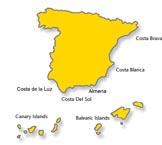Poll result could take Basque region into the unknown
 Madrid - Spain's troubled Basque region faced an eventual new era after regional elections on Sunday made it possible for a party advocating national unity to form the regional government for the first time.
Madrid - Spain's troubled Basque region faced an eventual new era after regional elections on Sunday made it possible for a party advocating national unity to form the regional government for the first time.
The Spanish socialists' good election result was a boost to Prime Minister Jose Luis Rodriguez Zapatero, but it was unclear what it might mean for the region beset by separatist pressures.
Basque socialist leader Patxi Lopez pledged to unite the Basques, who are divided over independence, if he becomes regional prime minister.
But the possibility of a Basque government headed by a mainstream Spanish party aroused fears of increased violence by the militant separatist group ETA.
Since the Basques were granted broad self-government in 1979, the northern region of 2.1 million people has been governed by the Basque Nationalist Party (PNV), which seeks a looser relationship with Spain.
PNV leader Juan Jose Ibarretxe, who has headed regional governments for a decade, tried to stage a regional vote on the Basques' "right to decide" their political future.
Ibarretxe believed an open discussion on a status close to independence would help to solve the problem of ETA, which has killed more than 800 people over four decades, but his plans were blocked by the Spanish Parliament and judiciary.
The PNV took another victory in Sunday's elections, but the socialists greatly increased their support, making it possible for Lopez to form a government if he managed to negotiate a coalition with the conservatives and the small UPyD party.
Several further other options remained open, including another coalition headed by Ibarretxe or a coalition between the socialists and PNV.
Lopez' success was a welcome boost to Zapatero, who had been losing support over Spain's deepening economic slump, but it was also perceived as taking the region into the unknown.
The Basque socialists had increased their support partly thanks to Zapatero's move to negotiate with ETA in 2006.
The premier was seen as making a serious attempt to seek a political solution to the Basque conflict, even if the incipient talks collapsed after six months.
Focusing his campaign on the economy and other pragmatic issues rather than on self-determination, Lopez pledged to unite the Basques, half of whom traditionally vote for parties courting separatist sentiments.
Those sympathetic to independence are also divided between the mainstream moderates opposed to the violence of ETA and a minority, which is supportive to the group.
Pro-ETA parties took about 12 per cent of the Basque vote before being definitively barred from contesting elections for the first time on Sunday.
If Lopez becomes the first non-nationalist Basque prime minister, however, he could divide as well as unite, analysts said.
Lopez sought to counter PNV claims that he would allow Basque affairs to be run from Madrid, but he was deemed likely to toughen policies against the entourage of ETA in the fight against terrorism.
That could increase desperate violence by an ever weaker ETA, making it more of a challenge for Lopez to "change the course" of Basque history as he promised to do on Sunday, analysts said. (dpa)